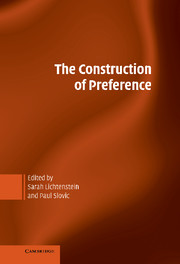Book contents
- Frontmatter
- Contents
- Contributors
- Preface
- Acknowledgments
- I INTRODUCTION
- II PREFERENCE REVERSALS
- III PSYCHOLOGICAL THEORIES OF PREFERENCE REVERSALS
- IV EVIDENCE FOR PREFERENCE CONSTRUCTION
- V THEORIES OF PREFERENCE CONSTRUCTION
- 17 Constructive Consumer Choice Processes
- 18 Decision Making and Action: The Search for a Dominance Structure
- 19 Pre- and Post-Decision Construction of Preferences: Differentiation and Consolidation
- 20 Choice Bracketing
- 21 Constructing Preferences From Memory
- VI AFFECT AND REASON
- VII MISWANTING
- VIII CONTINGENT VALUATION
- IX PREFERENCE MANAGEMENT
- References
- Index
17 - Constructive Consumer Choice Processes
Published online by Cambridge University Press: 05 June 2012
- Frontmatter
- Contents
- Contributors
- Preface
- Acknowledgments
- I INTRODUCTION
- II PREFERENCE REVERSALS
- III PSYCHOLOGICAL THEORIES OF PREFERENCE REVERSALS
- IV EVIDENCE FOR PREFERENCE CONSTRUCTION
- V THEORIES OF PREFERENCE CONSTRUCTION
- 17 Constructive Consumer Choice Processes
- 18 Decision Making and Action: The Search for a Dominance Structure
- 19 Pre- and Post-Decision Construction of Preferences: Differentiation and Consolidation
- 20 Choice Bracketing
- 21 Constructing Preferences From Memory
- VI AFFECT AND REASON
- VII MISWANTING
- VIII CONTINGENT VALUATION
- IX PREFERENCE MANAGEMENT
- References
- Index
Summary
Consumer choices concerning the selection, consumption, and disposal of products and services can often be difficult and are important to the consumer, to marketers, and to policy makers. As a result, the study of consumer decision processes has been a focal interest in consumer behavior for over 30 years (e.g., Bettman, 1979; Hansen, 1972; Howard & Sheth, 1969; Nicosia, 1966). One can infer from recent trends in the nature and structure of the marketplace that the importance of understanding consumer decision making is likely to continue. Rapid technological change, for instance, has led to multitudes of new products and decreased product lifetimes. In addition, new communications media, such as the World Wide Web, have made enormous amounts of information on options potentially available (Alba et al., 1997). Further, consumers are often asked to make difficult value tradeoffs, such as price versus safety in purchasing an automobile, environmental protection versus convenience in a variety of goods, and quality of life versus longevity in complex health care decisions.
How do consumers cope with the decisions they must make, some of which involve difficult tradeoffs and uncertainties? One approach to studying consumer decisions has been to assume a rational decision maker with well-defined preferences that do not depend on particular descriptions of the options or on the specific methods used to elicit those preferences. Each option in a choice set is assumed to have a utility, or subjective value, that depends only on the option.
- Type
- Chapter
- Information
- The Construction of Preference , pp. 323 - 341Publisher: Cambridge University PressPrint publication year: 2006
- 5
- Cited by



